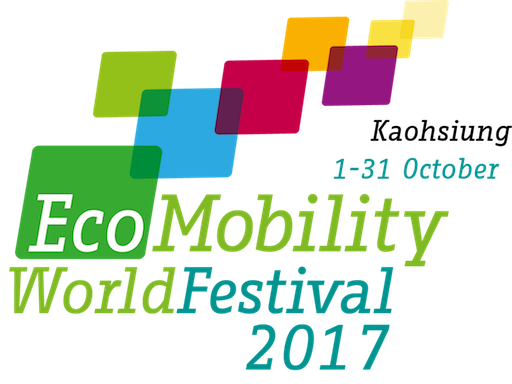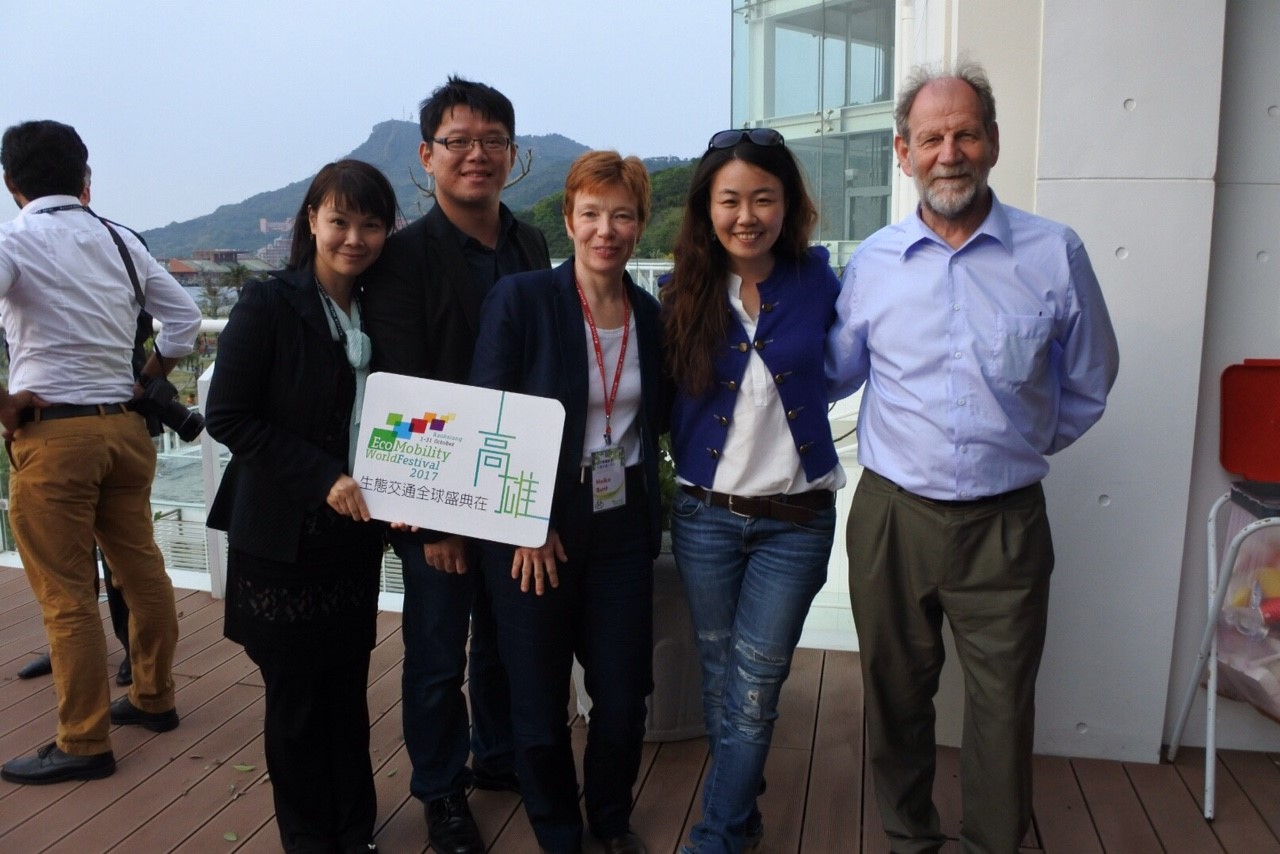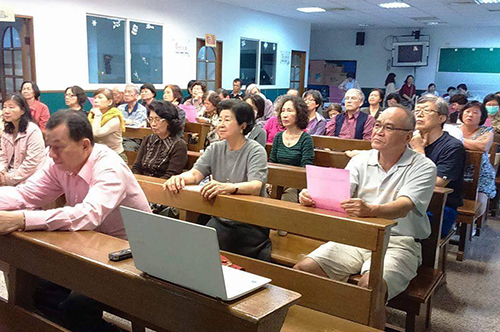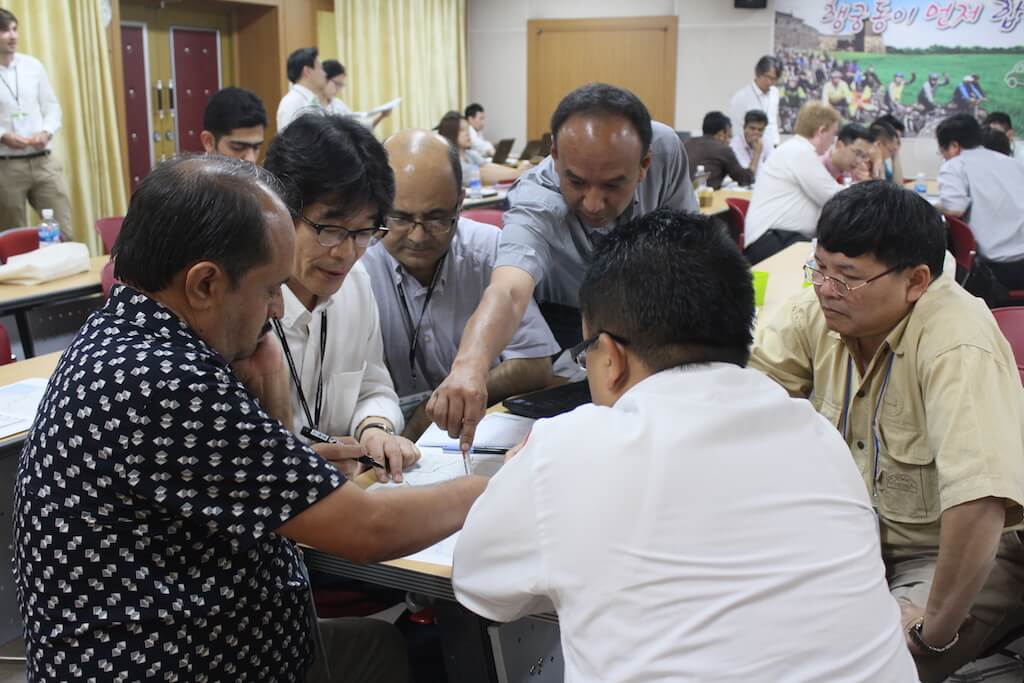EcoMobility World Congress 2017
2-4 October 2017 | Kaohsiung
P1 TOWARDS ECOMOBILITY, WHERE ARE WE NOW?
CONGRESS OPENING
- Welcome from the EcoMobility World Congress 2017
Chen Chu, Mayor, City of Kaohsiung - Introduction and welcome by ICLEI
Gino Van Begin, Secretary General, ICLEI-Local Governments for Sustainability, Bonn, Germany - Towards car-lite multi-modal urban mobility (keynote)
Limin Hee, Director of Research, Center of Liveable Cities (CLC), Singapore - Our Ecomobility Agenda Ecomobility – 10 years en route
Konrad Otto-Zimmermann, Creative Director, The Urban Idea, Freiburg, Germany - Mainstreaming ecomobility in urban and regional development
Chow Kon Yeow, State Executive Councilor for Local Government, Traffic Management and Flood Mitigation, Penang State, Malaysia - Ecomobility, contribution to the New Urban Agenda and the Paris Agreement
Clayton Lane, CEO, Institute for Transportation and Development Policy (ITDP), New York, USA - Congress program and introduction of the Kaohsiung Strategy
Monika Zimmermann, Deputy Secretary General, ICLEI-Local Governments for Sustainability, Bonn, Germany
A1 Creating livable cities through ecomobility
- EcoMobility in the city of Kaohsiung
Li Ming Hsu, Vice Mayor, Kaohsiung - EcoMobility, lever of urban innovation in Suwon
Tae-Young Yeom, Mayor, Suwon, South Korea - Livable Cities: It is All About the Street
Camilla Ween, Director of Goldstein Ween Architects, Chair of Trustees of Spacelink Learning Foundation, President of Women’s Transportation Seminar (WTS), London, United Kingdom - Livable Cities: EcoMobility in the city of Boulder
Suzanne Jones, Mayor, Boulder, USA - Creating a livable city through ecomobility – an example of Melbourne
Nic Frances Gilley, Chair of Transport, Melbourne, Australia
A2 Mobility as a Service (MaaS)
- Introduction and moderation
Susan Zielinski, Independent Mobility Innovator, Consultant and Writer, Canada; former managing director of Sustainable Mobility & Accessibility Research & Transformation (SMART), University of Michigan, USA - Bike and car sharing is a form of MaaS in cities
Ma Shuang, Researcher, Tsing-hua University, Beijing, China - The Impact of On-Demand Ridesharing Services on Transportation in Cities
Paige Tsai, Transportation Research & Policy, Uber, San Francisco, USA - Will MAAS solve the congestion problem on Freeway No.5
Mu-Han Wang, Director General, Department of Science and Communications (MOTC), Taipei
A3 Smart mobility for smart cities
- Introduction and moderation
Robert Stussi, CEO, Perform Energia Consulting, Lisbon, Portugal - Smart mobility practice in Jakarta
Elly Sinaga, Director General, Greater Jakarta Transport Authority, Jakarta, Indonesia - Smart Mobility and Smart Transportation in Tainan
Michael Chang, Vice Mayor, City of Tainan - Smart charging and shared electric vehicles: An innovative pilot in Utrecht
Baerte de Brey, Stedin, Utrecht, Netherlands - Digital Mobility Infrastructure for Smart Mobility City
Yung-Chang Chang, President of ITS Taiwan and Managing Director of Far Eastern Electronic Toll Collection Co., Ltd. - Smart mobility in action
Polly Yang, Technical Sales Manager Taiwan Operations and Regional Vice President, ST Microelectronics, Greater China and South Asia region, Taipei
B1 Safer and healthier cities for us and our children
- Introduction and moderation
Dhawal Ashar, Managing Associate, World Resource Institute (WRI) India, India - How livable neighborhood improve children’s safety and health
Daniel Sauter, Urban Mobility Research, Zurich, Switzerland - Designing safer and healthier cities for and with children
Gregor Mews, Director, Urban Synergies Group, Canberra, Australia - Improving road and transit safety for the City of Kaohsiung
Chun-Hsien Chiu, Senator, Kaohsiung - Moving Towards A Safer and Healthier Transportation System: Taiwan’s Experience
Hsin-Li Chang, Professor, Department of Transportation and Logistics Management, National Chiao Tung University, Hsinchu - Fight for safety: Challenges and opportunities of Vietnamese cities
Khuat Viet Hung, Director General of Transport Department, Ministry of Transport of Vietnam, Executive Vice Chairman of National Transport Safety Committee, Hanoi, Vietnam - Active mobility for a healthier and more equitable society
Manfred Neun, President, European Cycling Foundation, Germany
B2 Financing shared mobility and cross-sectorial synergy
- Introduction and moderation
Sunny Kodukula, Project Coordinator, Wuppertal Institute, Wuppertal, Germany - Decision-making models for financing urban mobility
Prashanth Bachu, Urban transport consultant, WRI India - A Successful Public-Private Partnership: YouBike
Vicky Yang, CEO, Cycling Lifestyle Foundation, Spokesperson for Youbike, Founder for Cycling Lifestyle Foundation, Taipei - Urban Transport Financing: How to find a balanced mix of economic instruments?
Manfred Breithaupt, Senior Transport Advisor, Frankfurt, Germany - Future mobility investment
Tony Verb, Co-Founder and Managing Partner, GreaterBay Ventures and Advisors, Hong Kong
B3 Vehicles of the future
- Introduction and moderation
Konrad Otto-Zimmermann, Creative Director, The Urban Idea GmbH, Freiburg, Germany - Self-driving vehicles in cities: A blessing or a curse?
Martin Ting, General Manager, 7Starlake, Taipei - Transition to Sustainability
Isabel Fan, Regional Director, TESLA Motors, Taipei - ZEV Action Plan in Changwon
Seungho Ha, Head of ZEV Team, Changwon, South Korea
PEOPLE, PEDALS, PARKS
Kaohsiung EcoMobility Dialogues (KED) #1
- Mobility from a people perspective
Robert Stussi, CEO, Perform Energia Consulting, Lisbon, Portugal - City on a bike
Manfred Neun, Director, European Cycling Federation, Germany - Of Parks and Public Spaces
Bronwen Thornton, Development Director, Walk 21, United Kingdom
P2 URBAN MOBILITY: A CENTERPIECE IN BUILDING LIVABLE CITIES
MAYORS’ PANEL
- Chen Chu, Mayor, Kaohsiung
- Jan van Zanen, Mayor, Utrecht, Netherlands
- Park Jae Min, Deputy Mayor for Administrative Affair, Busan, South Korea
- Tano Harumitsu, Vice Mayor, Kumamoto, Japan
C1 People-centered urban mobility
- Improving walkability and cycling in the city of Kyoto
Hiroshi Tsukaguchi , Professor, Ritsumeikan University, Kyoto, Japan - Public consultation process while planning for ecomobility in Petaling Jaya
Johary Anuar, Vice Mayor, Petaling Jaya, Malaysia - Low car density for livable cities: Towards a goal of 150 cars per 1000 inhabitants
Tim Schubert, Senior Expert mobility, German Environment Agency, Germany - Designing cities for equitable access through transport planning and land-use management
Xue-Tai Chen, Deputy Director-General, Transport Bureau, Tainan
C2 Mobility of the future: Personal or shared?
- Moderator presentation: Clayton Layne, Chief Executive Officer of Institute for Transportation and Policy Development (ITDP)
- Presentation by Jason Chang, Professor, National Taiwan University, Taipei
- Mobility of the future: personal or shared
Elin Chou, Senior Manager, Unicar sharing, Taipei - Auckland’s transformation strategy in sustainable transportation
Wayne Walker, Councillor, Auckland, New Zealand - Susan Zielinski, Independent Mobility Innovator, Consultant and Writer, Canada; former managing director of Sustainable Mobility & Accessibility Research & Transformation (SMART), University of Michigan, USA
C3 Technology- assisted (eco)mobility
- Mobility platform for the disabled and elderly: Towards equitable mobility
Amir Nivy, Founder & CEO, Hapitus, Singapore - Innovation and technology for sustainable transportation
Christina Olsen, Program Director, Meeting of the Minds, USA - LiDAR Technology and TOV for Autonomous Vehicles
TC Chiang, Division Director, Information and communications research laboratories. Division for - Telematics & Vehicular Control System, Hsinchu
Juan José García Gabian Beasain Asia Director, Construcciones y Auxiliar de Ferrocarriles, Taipei - Autonomous public transportation: A comparison between Europe and Asia
Thierry Mocquiaux, Director of Business Development, RATPDev Transdev ASIA, Hong Kong
D1 EcoMobility Alliance cities in action
- The current situation of ecomobility policy in Changwon
Jungho Kwon, Director-General, Bureau of Security, Construction, and Transportation, Changwon, South Korea - Strategies and achievements for a low carbon mobility system in Almada
Catarina Freitas, Director-General, Department for Energy, Climate, Environment and Mobility, Almada, Portugal - The integration of transport as an ecomobility component in the Metropolitan Area of the Arubba Valley, Colombia
Luis Ramon Perez Carrillo, Project Vice Director, Área Metropolitana del Valle de Aburra, Colombia - Presentation
Leah Treat, Director, Portland Bureau of Transportation, Portland, USA
D2 Policy framework for shared mobility
- Innovation in Governance: A comparison of bike-sharing policy between china and Hong Kong
Dawn Chui, Head of Business Development, Hong Kong Science and Technology Parks Corporation, Hong Kong - Transport demand management (TDM) and policy frameworks for transport planning in Jakarta
Tonny Agus Setiono, Chief of Planning Division, Greater Jakarta Transport Authority, Ministry of Transport, Jakarta, Indonesia - Advocating for shared mobility in Kaohsiung
Yizhen Wu, City Councillor, Kaohsiung - Connecting the dots: the evolution of policy for multi-modal door-to-door ecomobility
Susan Zielinski, Independent Mobility Innovator, Consultant and Writer, Canada; former managing director of Sustainable Mobility & Accessibility Research & Transformation (SMART), University of Michigan, USA
D3 Co-benefits of ecomobility
- Looking at ecomobility and the sustainable mobility pillars
Todd Litman, Executive Director, Victoria Transport Policy Institute, Canada - Innovation and technology for sustainable transportation: Practice in Guangzhou
Maosong Zhou, Guangzhou Urban Planning and Design Survey Research, Guangzhou, China - EcoMobility and Creativity – The business model of bike tourism and sharing economy
Hsin-wen Chang, Dean and Professor, Department of Leisure and Recreation Management, Chung Hwa University, Hsinchu - New Opportunities for Green Energy Create New Value of Port
Men-Feng Wu, Chairman, Taiwan International Ports Corporation Ltd. - The Chiang Mai we want : Low carbon mobility and sustainable urban system management Trinnawat Suwanprik, Sanitary Researcher, Chiang Mai municipality, Thailand
CLEANER FUEL FOR CLEANER TRANSPORT
Kaohsiung EcoMobility Dialogues (KED) #2
- A new local energy and transport system
Robin Berg, Founder, LomboXnet, Utrecht, Netherlands - Right size – a cornerstone of urban ecomobility and right screen presentation
Konrad Otto-Zimmermann, Creative Director, The Urban Idea GmbH, Freiburg, Germany - Which comes first – clean vehicles or clean fuels?
Horace Luke, CEO, Gogoro Inc electric scooters and battery swapping company, Taipei
P3 TOWARDS INTEGRATED AND SHARED MOBILITY
KEYNOTE
- Introduction and moderation
Emani Kumar, Deputy Secretary General, ICLEI South Asia Secretariat, New Delhi, India - A different approach to health and mobility
Jan van Zanen, Mayor, Utrecht, Netherlands (keynote) - The future of mobility is shared
Robin Chase, Founder, ZipCar, GoLoco, Buzzcar, Veniam ‘Works, USA (keynote)
E1 Intelligent Transport System (ITS): Using technology to make mobility accessible and safe
- Altering travel and driving behavior with ITS
Haji Ismail bin Md. Salleh, President, ITS Malaysia, Kuala Lumpur, Malaysia - How ITS could help multi-modal trip planning?
Sorawit Narupiti, ITS Thailand and Associate Professor of Civil Engineering, Chulalongkorn University, Bangkok, Thailand - Introduction to Smart Transportation System in Taoyuan City
Chi-Chung Hsiung, Chief Secretary, Department of Transportation, Taoyuan - Future of Smart Transportation
Jia-Ru Li, CEO, LILEE Systems, San Jose, USA
E2 Ecologistics in cities
- Greening freight distribution at the city and global level
Björn Hannappel, Head of Responsibility Strategy & Standards, Deutsche Post DHL Group, Bonn, Germany - Urban logistics in Almada: The path towards eco-efficiency
Catarina Freitas, Director-General, Department for Energy, Climate, Environment and Mobility, Almada, Portugal - Urban freight development in Chinese cities
Boyong Wang, Smart Freight Centre, Beijing, China - Roling the Port toward Ecologistics
Tien-Kuei Kuo, President, Taiwan International Ports Corporation Ltd., Taipei
E3 Integrating mobility and shared mobility
- Integration of informal and formal mobility system: An example of Ludhiana, India
Vishesh Sarangal, Additional Commissioner, Ludhiana, India - MR. B&B in Taichung
Hui-Sheng Feng, Deputy Director, Transportation Bureau, Taichung City - Sydney’s Bennelong Bridge: Ecomobility through infrastructure and service integration
Bryony Cooper, Associate, City+Co, Sydney, Australia - Video and Presentation
Leung Siqing, Deputy Director, Urban Planning and Design Institute of Shenzhen, Shenzhen, China - Integrated, Seamless & Smart Transit in New Taipei City
Sheng-Wei Wang, Commissioner, Transport Bureau, New Taipei City
P4 HOW THE PRIVATE SECTOR CAN CONTRIBUTE TO SUSTAINABLE URBAN MOBILITY
KEYNOTE
- Climate change mitigation: Sustainability development in mobility
With climate change, Delta, as an industry leader, adopted a long-term strategy to provide efficient and clean transportation and buildings. These include electric car charging facility, an integrated LED street lighting solution, and port crane energy recovery system that are used locally and internationally – slowly moving cities towards sustainable development.
Bruce Cheng, Founder, Delta Group, Taipei (keynote)
P5 THE FUTURE OF MOBILITY IN OUR CITIES
CLOSING PLENARY
- Message from the Mayor of Bonn (Video Presentation)
Ashok Sridharan, Mayor, Bonn, Germany - Our messages on current and future challenges in urban mobility
The Kaohsiung Strategies (Congress outcome) Monika Zimmermann, Deputy Secretary General, ICLEI - The future of mobility in our cities, are we prepared? Discussion with panel and audience
Robin Chase, Founder, ZipCar, GoLoco, Buzzcar, Veniam ‘Works, USA
Clayton Lane, CEO, Institute for Transportation and Development Policy (ITDP), New York, USA
Lloyd Wright, Asian Development Bank (ADB), Manila, Philippines
Huey Yee Yoong, Vice-President – National Transformation Plan Implementation, PEMANDU Associates, Greater Kuala Lumpur, Malaysia
Tim Schubert, Senior Mobility Expert, German Environmental Agency, Germany
Andrea Garcia, ICLEI EcoMobility Program Manager, ICLEI World Secretariat, Bonn, Germany 0- put at the last - Recap on the EcoMobility World Congress 2017 (Video Presentation)
Congress streams
Livable
Shared
Intelligent
Previous EcoMobility World Congresses
The EcoMobility Dialogues explored ways to reduce the dominance of private automobiles in cities and to build an urban transport system that meets the needs of residents while minimizing energy consumption, emissions, material use and space requirements. The topics of the three dialogues were:
- Reshaping cities for EcoMobility: Strategies and tactics
- Achieving and enabling EcoMobility: New and shared forms of mobility
- Making the commuting decisions safe, sustainable and popular
More information is available on the Festival website, including all available presentations from the various speakers at www.ecomobilityfestival2015.org
The Congress highlighted the importance of EcoMobility from a range of perspectives, including local leadership, social inclusion, health, future generations, and practical applications. The Congress underscored EcoMobility as an active concept – something to be applied and developed and shared. The Congress emphasized the integration, development, and promotion of active modes such as walking, cycling, wheeling, public transport and shared transport systems.
More information is available on the Congress website, including all available presentations from the various speakers. http://emwf2013.iclei.org/
Participants at the first Alliance workshop held in Changwon discussed the importance of people-friendly urban spaces. The workshop concluded that urban spaces can be safe and attractive when they are designed for people rather than automobiles. Changwon City served as the perfect host after converting some of its urban areas for exclusive pedestrian use and also dedicating a disused railroad for cycling.




